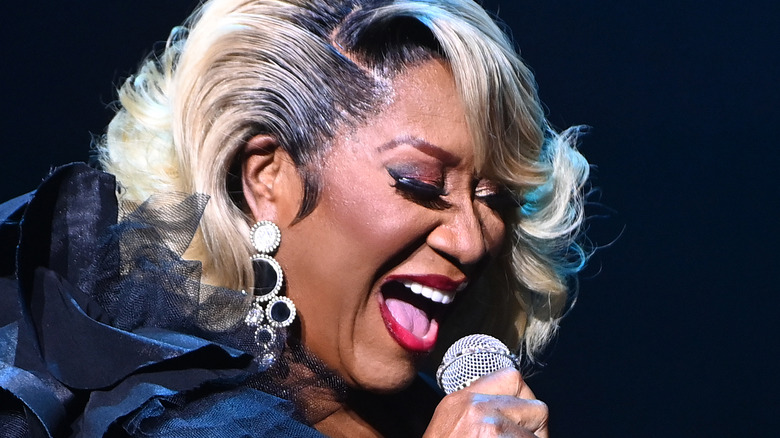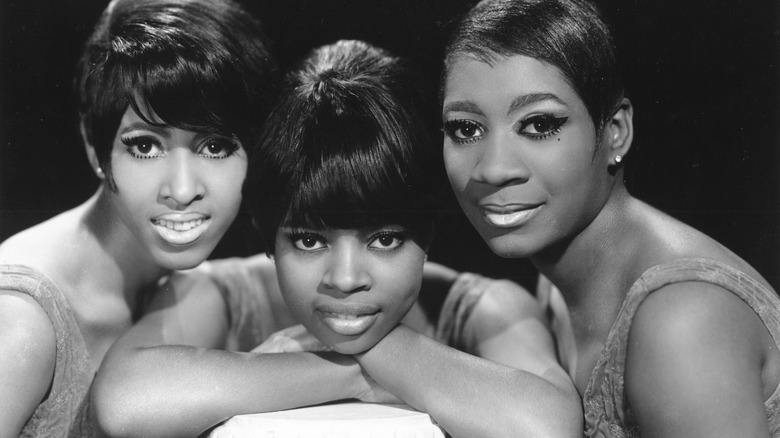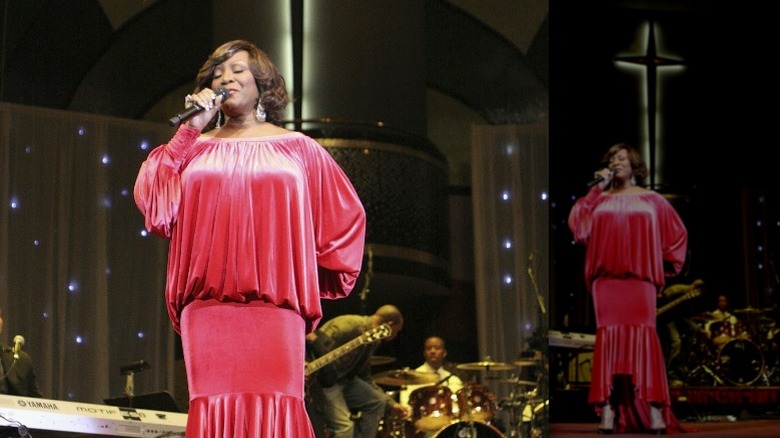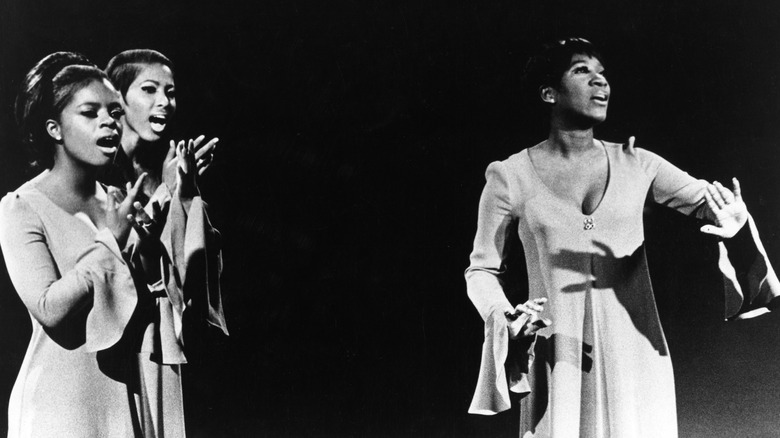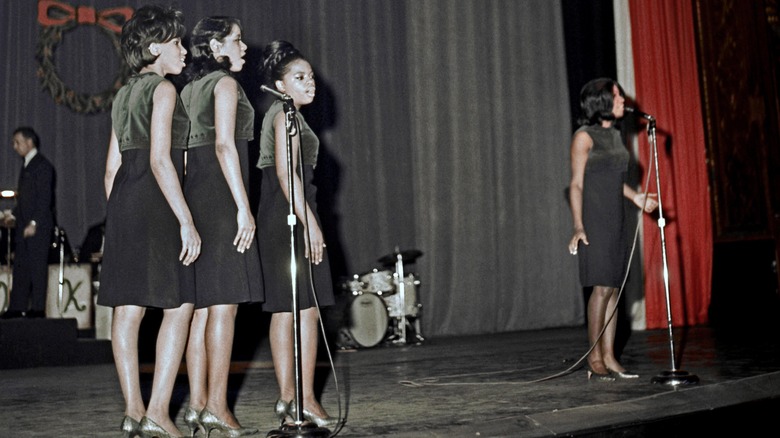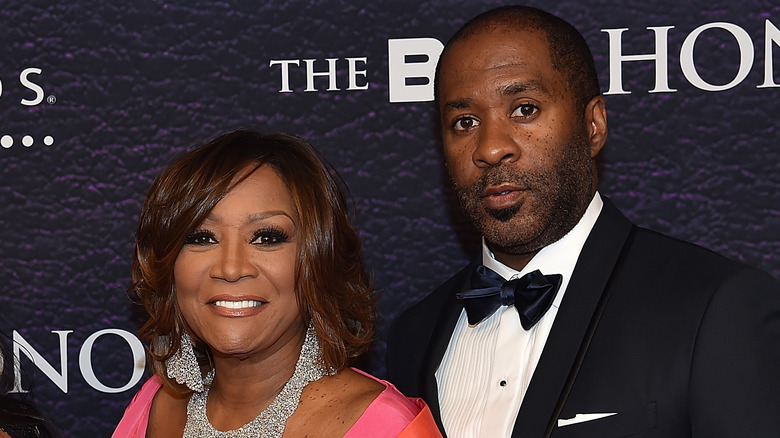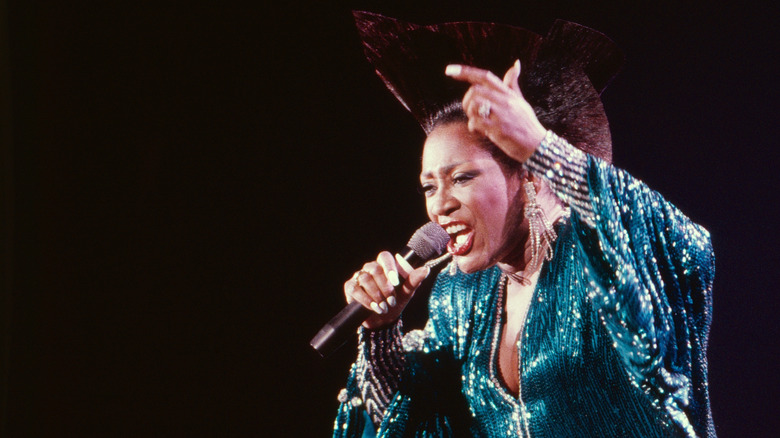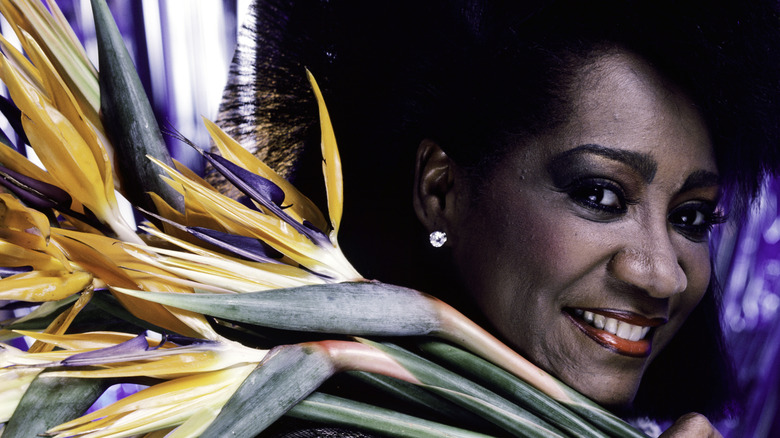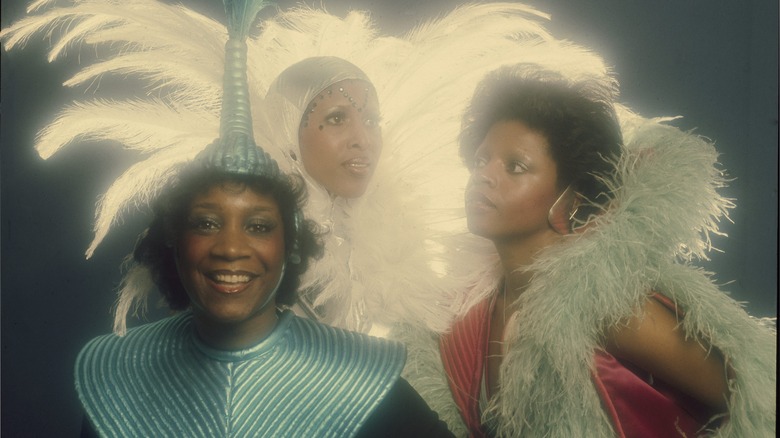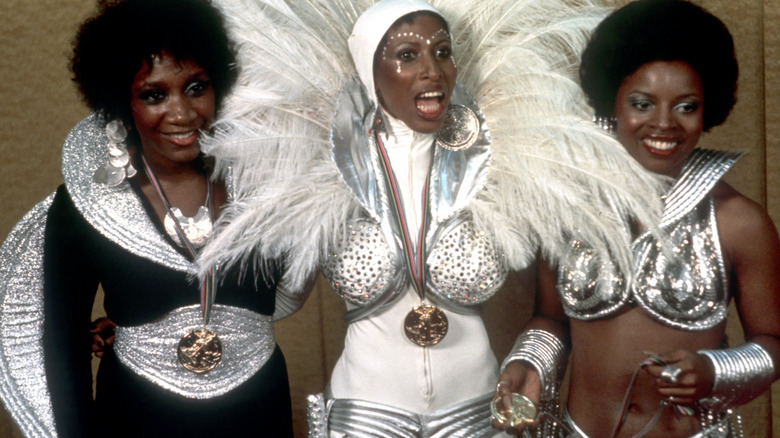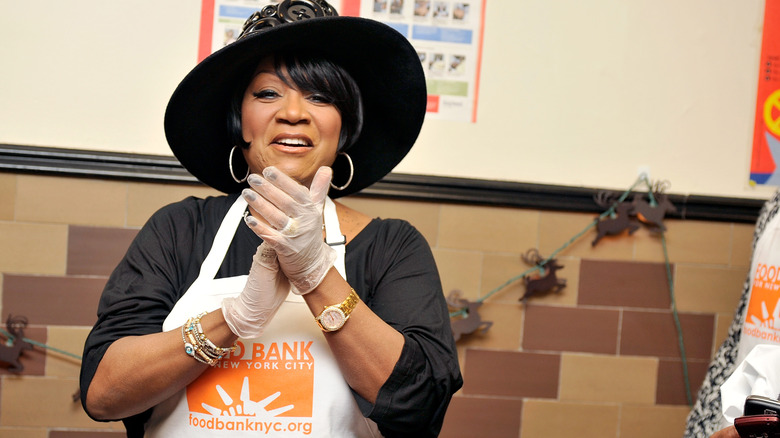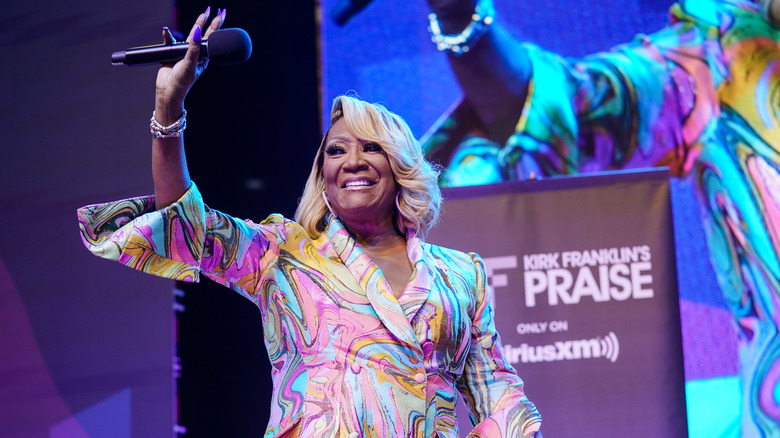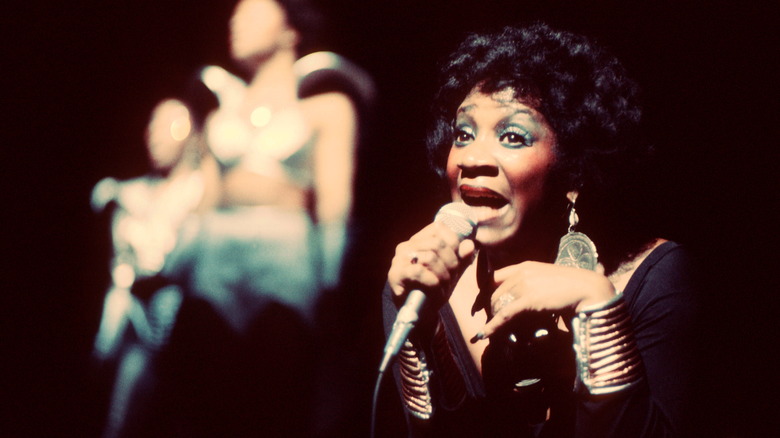Patti LaBelle: From Childhood To The Godmother Of Soul
Some singers have a natural gift, while others have an innate musical ability that makes melodies seem effortless. And some? Some singers are forces of nature.
The latter is Patti LaBelle, the rightfully crowned Godmother of Soul, who didn't just sing — she owned the stage. Branching out into acting, activism, and creating her own food empire, she's just one of those people that has more talent than what seems possible for a single person. Born May 24, 1944, LaBelle kicked off her career as part of the Ordettes, which by the early 1960s became the Bluebelles, as detailed by Biography. After hitting a rough patch with the departure of one member (Cindy Birdsong, who joined up with Diana Ross and the Supremes), LaBelle and her Bluebelles overhauled their image into the ultra-70s group LaBelle — and that's when they hit it big with one of the most iconic hits of the decade, "Lady Marmalade."
The list of LaBelle's achievements is a lengthy one. So lengthy, in fact, that it's easy to forget everything that she's been a part of. From securing parts in "Beverly Hills Cop" and "American Horror Story" to authoring a cookbook and serving as the genius behind some crazily delicious sweet potato pies, LaBelle has done it all. But how? Let's dim the stage lights a little and look at some lesser-known bits of trivia about this powerhouse of soul.
Patti LaBelle had a difficult childhood
There's no denying that everyone is shaped by their childhood, for better or worse. Patti LaBelle has been candid about her conflicted relationship with her parents, openly talking about both the good and the bad — and there was plenty of both.
In 2021, she sat down with Dan Rather for an interview, saying that even though her childhood was filled with memories of her parents always fighting, "they were there long enough for me to learn right from wrong." She continued, "My mother was such a lady, beautifully dressed, all the time. My father was a drinker and a beater." Their fighting impacted her, too, and LaBelle says that it got so bad and the stress was so great that when she would hear the arguing begin, she would break out in hives. Growing up in that environment made her grow into a shy, nervous girl, and although things got better when her parents divorced, it still wasn't all smooth sailing.
In her memoir "Don't Block the Blessings," she talks about not only how challenging it was seeing her parents dating, but she also revealed that she had been sexually assaulted by one of her mother's boyfriends. The memories, she said, were vague, and she knew that was her mind's way of protecting her from what she knows happened in the basement of her childhood home. She described the memory: "Like a slow torture, a fever blister that will neither erupt nor heal."
If you or anyone you know has been a victim of sexual assault, help is available. Visit the Rape, Abuse & Incest National Network website or contact RAINN's National Helpline at 1-800-656-HOPE (4673).
She credits her choir director with allowing her to share her voice
Given that Patti LaBelle discussed her life on the Jesus Calling podcast, it's perhaps not surprising that it's faith she credits for setting her on the path to global stardom. LaBelle says that she was more comfortable talking to her pets than people, and it wasn't until she went to church that she met the woman who would change her life: Miss Chapman, the choir director.
LaBelle already knew she liked to sing. She did it at home all the time, she told Oprah Daily, where no one could see her: She would stand in front of the mirror and use a broom in lieu of a microphone. "I kept that voice to myself until I joined the choir," LaBelle said. Initially, she had only wanted to be a part of the choir, one voice in a sea of voices. But she says that Chapman heard her and told her that she was going to have a solo — and she didn't give her much of a choice.
"I think that's why I'm Patti LaBelle today. Because she brought that shy Patti out into the world," LaBelle said (via Oprah Daily). "And when I did my first solo, I got an 'Amen' and a standing ovation. So thank God to Miss Chapman that I am who I am now, because I would have kept that to myself, I think, unless somebody had pulled it out of me."
Patti LaBelle got her first taste of stardom on the chitlin' circuit
Patti LaBelle told the Jesus Calling podcast that it was at church that she met the women who would join her in the Ordettes and from there, she turned to other types of music. LaBelle — with Sarah Dash, Nona Hendryx, and (at first) Cindy Birdsong soon changed their name to the Bluebelles, and when 1962 hit, so did their first big hit: "I Sold My Heart to the Junk Man."
From there, the Bluebelles started touring, but this was the early 1960s — and that meant that opportunities for Black artists were limited. The group set out on what was called the chitlin' circuit, and according to The Virginian-Pilot, they were one of the biggest hits of the time. So, what's the chitlin' circuit? Atlas Obscura explains that it was a series of sort of unofficially organized entertainment venues where Black performers could take the stage. Everyone from LaBelle to Ray Charles, Tina Turner, and even Jimi Hendrix traveled the circuit in their performing days, and yes, it was named for the southern dish that's made from stewed intestines. Why? Because sometimes, they were paid in chitlins — or, if they were lucky, full, filling meals.
LaBelle told The New York Times that it shaped not just her career, but her. It taught her how to survive, to make do, and it made her resilient. "I'm happy we had a chitlin' circuit. It makes me be a better me."
She's been candid about her struggles touring in the South
The name of the chitlin' circuit was also metaphorical, says The New York Times: Chitlins were the leftovers, as were the opportunities for Black artists. It's no secret that the world in general has come a long way in the last few decades, but it's worth remembering what artists like Patti LaBelle went through in the 1960s — and in the grand scheme of things, it wasn't that long ago.
In 2021, Dan Rather asked LaBelle what it was like touring in the South when she was just getting started, and she candidly answered, "It was horrible. Going into the backs of restaurants, getting take-out, of course, because you're not allowed to sit inside. You're not allowed to go into a real hotel. Some nights we stayed in our station wagon."
LaBelle said that their group — who traveled with their manager and a chaperone — wasn't the kind to kick off a fight when someone threw some racial slurs their way — although it happened a lot. Her perspective was both inspiring and heartbreaking: It was just the way the world was, so they had to decide what to do with it. Rather than dwell on it, LaBelle said, "We rolled through the hate. We sang through the hate. And we all grew into fine ladies."
Patti LaBelle has two greatest achievements
Patti LaBelle has packed a lot into her decades-long career, so what stands out as being the most important to her? That's what Oprah Daily asked her, and she answered.
When it came to events on a historic scale, LaBelle said that the most important to her was taking the stage at the Metropolitan Opera House with her group, LaBelle. "Being the first Black woman to play the Opera House in New York, and the show was so spectacular," she said. She recalled that it wasn't just a show, it was an event where all the guests had to wear silver. Everyone who was anyone was there, and she called it the moment she knew that they were a part of something that was going down in the history books.
Her second was a personal achievement, which was carrying and giving birth to her son, Zuri (pictured). At the time she was pregnant, she was performing with LaBelle, and she said that there was almost overwhelming pressure to either leave the group or have an abortion. LaBelle did neither: "... [T]hat sort of tested me, because nobody really wanted me to become pregnant. ... Having my baby was going to be a problem to some people." Now? She says her son isn't just her manager, he's also her best friend.
Many of her family members have died young
Just because someone's famous, with an absolutely enviable career in the entertainment industry, doesn't mean they're exempt from tragedy and heartbreak. For Patti LaBelle, that heartbreak has come in the form of the loss of beloved family members, including all three of her sisters.
When LaBelle spoke with the Jesus Calling podcast, she told a gut-wrenching story about her sister, Jackie. She had been diagnosed with cancer, and was in a hospital just a few minutes from where LaBelle was living when she wasn't on tour. It was one evening when she returned from a tour that her sister reached out and asked her if she could stop by for a visit — and to make her one of her family-famous bacon and egg sandwiches. LaBelle said she was too tired, and promised her she'd stop by tomorrow: "And the next morning, my aunt says, 'Sugar, don't rush with the sandwich. Your sister just died.'" LaBelle continued, "So, of course, that's been with me."
It wasn't long before her sister Barbara was also diagnosed with cancer, and then, her third sister, Vivian. All three died before their mid-40s, and LaBelle's parents died young, too: Her father passed away from complications stemming from Alzheimer's, and her mother — as well as her uncle — from complications of diabetes. "And I was still standing," LaBelle said. "It made me feel like, 'Why not me?' And I still don't know."
Patti LaBelle has been honest about those she's had problems with
When Patti LaBelle released her autobiography, "Don't Block the Blessings," she shared a lot — and was honest about disagreements that she'd had even with friends. When she was performing with Dionne Warwick at the Aquarius Theater in Los Angeles, for example, Warwick pulled her aside during rehearsal and asked her, "'Do you think you can tone it down some this time around?'" When Warwick asked her again — this time, in front of the crew and the band — LaBelle gave her a piece of her mind.
She was candid, too, about the competition between the Bluebelles and The Supremes. Even more shocking was what she had to say about Jackie Wilson. At the time they were all touring together, Wilson was at the height of his career. LaBelle wrote, "I worshiped the stage he moved on. My adoration changed to hatred in a dark corner of Brooklyn's Brevoort Theater one night."
LaBelle says that Wilson and an accomplice grabbed her, dragged her into a room, shut the door, and started to sexually assault her. "I didn't have a knife, but I did have my voice. I started screaming even louder," she wrote. "And I can scream every bit as loud as I can sing." Wilson and the other man released her, and she never spoke to him again. Feeling as though no one would ever believe her, she said it was the only thing she could do.
If you or anyone you know has been a victim of sexual assault, help is available. Visit the Rape, Abuse & Incest National Network website or contact RAINN's National Helpline at 1-800-656-HOPE (4673).
She has some surprising thoughts on Lady Marmalade
Listen to the lyrics of the smash hit, "Lady Marmalade," and it's clear that they're singing about something more than a little risque. (The remake for Moulin Rouge left even less to the imagination, says Rolling Stone.)
As a quick refresher, the song is the story of a sex worker and one of her clients. It includes lyrics like, "He sat in her boudoir while she freshened up, Boy drank all that Magnolia wine, On her black satin sheets where he started to freak." As sung by LaBelle, it's an incredibly powerful anthem — but here's the thing: She didn't actually know what she was singing about. That's what she told The Guardian in 2015, admitting. "We thought it was a woman just walking down the street — it didn't register that it might be about something else. We were very innocent, and I had no clue. I was very naive."
In all fairness, the refrain — in which the singer propositions her clients for a little behind-closed-doors, get-to-know-you-better fun times — is in French. Still, LaBelle says that it was only when she got word that they had upset some nuns that she stopped to ask what it was that they were singing: "I didn't know we were singing about a lady of the evening. Young girls today are so well versed because of the internet, so they'd never not realize, but it was different then."
Patti LaBelle credits therapy for allowing her to continue her career
Patti LaBelle and her group went from being the Bluebelles to LaBelle in 1971, and they went from the darlings of the 1960s to the glamorous trio that helped set the tone for the 1970s. They wouldn't make it through the decade as a group, though, and when they went their separate ways in 1976, LaBelle was devastated (via Sky).
She told The Cut that it wasn't long after the breakup of LaBelle that she went to therapy for the first time, and says that it not only helped her cope, but it's the reason she was able to get back on stage. "I thought I wasn't going to be able to sing anymore because I didn't want to go out as a solo performer," she explained. With professional help, though, she did — and once she got that first standing ovation, there was no turning back.
The experience helped shape LaBelle's outlook on life. Self-care is of the utmost importance, and she says that for her, that means walking her dog, dipping her feet in the pool, cleaning her home, and having cut flowers in the house — especially if she can arrange them herself. She also says it's made her an advocate for mental health, especially in the Black community: "We're afraid to say that we have a little issue and people saying we're crazy," she said — and says that the stigma needs to stop.
Cooking is just as important to her as singing
While Patti LaBelle might be best known for her singing, she's made her debut on the Cooking Channel, authored a cookbook, and gone viral for her sweet potato pies. So, this isn't just some kind of side hustle, and LaBelle says that she loves being in the kitchen just as much as she loves being on the stage.
By the time she spoke with Vanity Fair in 2017 about her culinary exploits, her first cookbook was almost 20 years old. And she has some great stories about being the go-to cook when she was touring, too: She's cooked for everyone from Mick Jagger and the Rolling Stones to Prince (who just wanted a roll). The best is arguably when she cooked for her backup band on a U.K. tour, which included a relatively obscure piano player named Reggie Dwight. Long before he became Elton John, he was infamous for something else: not returning LaBelle's Tupperware. (He gave her a diamond ring by way of apology, so all was forgiven.)
When LaBelle spoke with GuidePosts, she said that cooking was in her blood. Her mother, grandmother, and aunts were all cooks, and by the time she was five or six years old, they were teaching her to love it, too.
Here's what Patti LaBelle has to say about being a living legend
People have all different reasons for chasing a career in the entertainment industry. Whether it's fame, fortune, or the opportunity to visit a ton of exciting places while being center stage, there are no wrong answers. Patti LaBelle spoke with 21 Ninety around the time she started partnering with Old Spice — her father's go-to, she shared — and they asked her what message she wanted to leave behind with her legacy, and what it meant to her when people referred to her as a living legend. Her answers were kind of surprising.
First, she wanted her work to leave behind the idea that she "was an honest performer. ... I believed in doing a show from the heart — just a plain old basic show with a mic and a band." And the latter? It was 2022, and the then-78-year-old LaBelle wasn't as concerned with the "legend" part as with the "living" part: "[It's] a compliment, the highest compliment. A lot of my peers are gone, and I'm still living, so if somebody can call you a living legend, it is another blessing by the grace of God that I'm here ... And so, I say thank you."
At 76, this is the age Patti LaBelle would return to
Patti LaBelle was 76 years old when she spoke with Oprah Daily, and she had packed a lot into those decades. They had an interesting question to ask her, and it didn't have to do with where she wanted to see her career go — it was, perhaps, an even more personal question: If she could go back to any point in her life, where would it be?
For LaBelle, the answer didn't have much to do with her career at all — it had to do with her family. "I probably would be 30, when my sisters were all living. ... Oh, gosh, I miss everything we did together. ... And we just had fun doing things with my family." When she was 30, her sisters were still alive. Her father was still alive, her mother was still alive — and that was where she would like to be, even though at the time, there were a lot of fights. She reminisced about buying crabs by the bushel and fighting over the biggest ones, of singing competitions with her father. She recalled her sister going on tour with her and selling t-shirts. She explained: "So when I was 30, that was a good year. When everybody was living."
